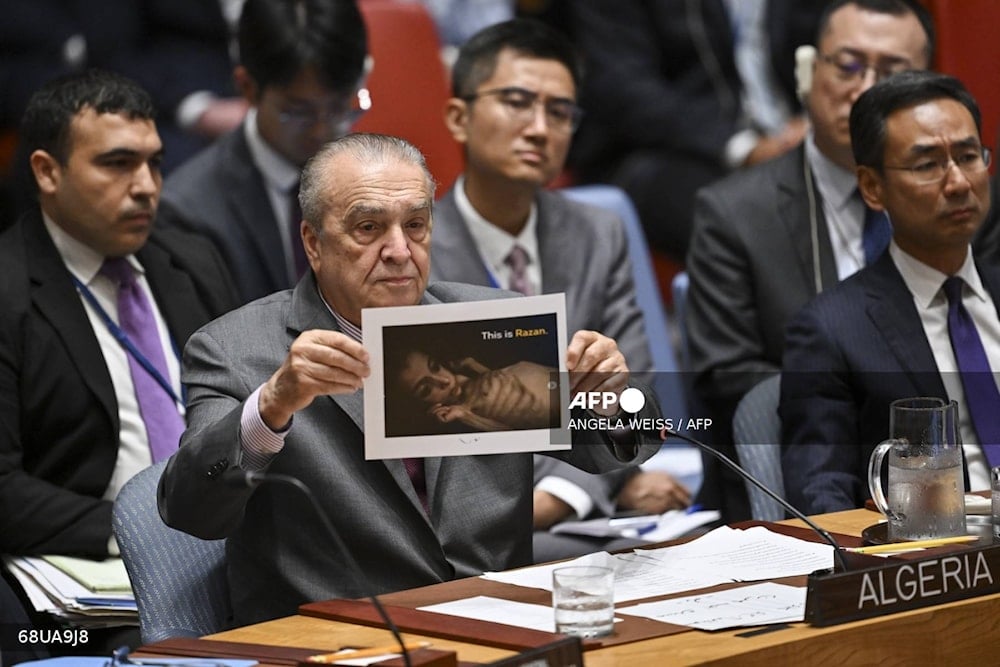UN Security Council holds emergency session on Gaza
UN Security Council debates the situation in Gaza in a session requested by the Israeli occupation and its allies.
-

Algerian Ambassador to the United Nations Amar Bendjama holds up an image of a starving child in Gaza during a United Nations Security Council meeting on the conflict in the Middle East, including the Palestinian question, at United Nations headquarters on August 5, 2025, in New York. (AFP)
The United Nations Security Council convened an emergency session on Tuesday to discuss the worsening humanitarian catastrophe in the Gaza Strip, with a particular focus on Israeli captives held by the Palestinian Resistance. The meeting was requested by the Israeli occupation and backed by the United States, Britain, and France.
At the heart of the session was a dual narrative: one pushed by Western powers to prioritize the return of Israeli captives, and another, backed by multiple nations, highlighting the genocidal campaign waged by the Israeli occupation against more than two million besieged Palestinians.
UN official: Gaza war expansion puts captives at deadly risk
UN Assistant Secretary-General for Europe, Central Asia and the Americas, Miroslav Jenca, opened the session with a stark warning: the decision by Israeli Prime Minister Benjamin Netanyahu to extend military operations across the entire Strip poses grave risks to both Palestinian civilians and Israeli captives.
Jenca condemned the “ongoing violence,” including the killing and maiming of people seeking food, reiterating that deliberately depriving civilians of life-saving aid such as food and water constitutes a war crime. He demanded unimpeded humanitarian access and an immediate end to the suffering, calling for “de-escalation and dialogue” over further bloodshed.
Read more: Netanyahu's push for Gaza occupation ignites tensions in 'Israel'
Resistance holds Netanyahu fully responsible for captives' fate
In a statement ahead of the session, the Palestinian Resistance movement Hamas placed full responsibility for the fate of Israeli captives on Netanyahu’s government, which it said continues to escalate starvation and block humanitarian aid.
“The captives would not remain in detention had the occupation respected the ceasefire agreement,” Hamas said, demanding binding UN resolutions to halt the campaign of genocide and ethnic cleansing.
The group stressed that the international community must hold "Israel" accountable for war crimes and demand immediate Israeli withdrawal from Gaza.
Read more: Relief at gunpoint: Gaza aid lines become 'Israel's' killing fields
West prioritizes occupation’s demands, denies genocide
In her address to the Security Council, US Ambassador to the UN Dorothy Shea adopted a confrontational tone, doubling down on Washington’s longstanding support for the Israeli occupation and placing sole blame for the war’s continuation on Hamas.
Shea referenced recently released videos of Israeli captives, describing them as evidence of Hamas’ “evil” and claiming that such footage should end all international pressure on “Israel,” urging instead “maximum pressure on Hamas.” The envoy insisted that the release of captives and the disarmament of the Palestinian Resistance were preconditions to peace in Gaza.
Echoing the Israeli government's rhetoric, Shea accused Hamas of rejecting ceasefire proposals and framed recent global diplomatic initiatives, such as the Two-State Solution conference and unilateral recognition of Palestine, as “publicity stunts” that “embolden Hamas.” She accused such moves of prolonging the war and undermining US-led mediation efforts.
Shea repeatedly praised the so-called Gaza Humanitarian Foundation (GHF), a US-backed entity operating under Israeli military supervision, claiming it had delivered over 100 million meals and dismissing reports of deaths at GHF distribution sites.
In a final show of deflection, the US envoy rejected accusations of genocide in Gaza as “politically motivated” and “cynical propaganda,” repeating unsubstantiated claims that Israel has taken “numerous measures to limit harm to civilians.” She reaffirmed US support for the Israeli military, even as tens of thousands of Palestinian civilians continue to face death, famine, and displacement under daily bombardment and siege.
Read more: Trump to 'take over' Gaza aid effort, citing Israeli inadequacy: Axios
Governments denounce double standards and mass starvation
Meanwhile, envoys from Russia, China, Algeria, Pakistan, Denmark, and other nations took the floor to condemn the ongoing massacres and systematic starvation of Palestinians.
Russian Deputy Ambassador Dmitry Polyanskiy expressed sympathy for the captives but condemned the daily images of Palestinian corpses, many of whom “die from hunger while trucks loaded with food remain blocked at the gates of Gaza.”
He rejected the occupation’s claims of easing restrictions and affirmed that the UN itself verifies the intentional denial of food, water, and medicine.
China’s envoy called for an immediate, permanent ceasefire, stressing that no territory can be annexed by force, a direct challenge to Israeli expansionism.
Algerian Ambassador Ammar Bendjama held “Israel” directly responsible for the continuation of captivity and warned that “systematic killing cannot become normalized.” He demanded a ceasefire and decried the UN’s double standards when it comes to occupation and aggression.
Read more: Top pro-Israeli advocate calls 'Israel’s' Gaza conduct ‘indefensible’

 5 Min Read
5 Min Read










